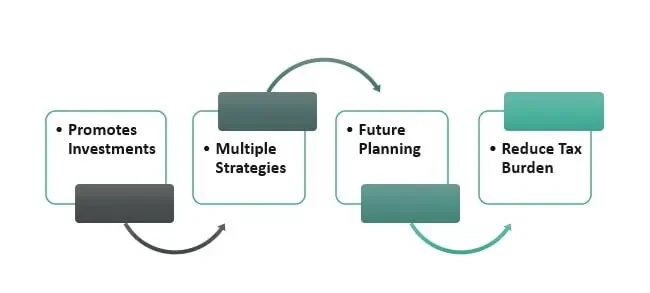When you look up the definition of wealth in a dictionary, it means abundance. Wealth is an abundance of resources, and wealth creation is all about making this abundance real. Wealth is the totality of our assets, whether real estate, cash or gold, mutual funds, stocks, etc. After subtracting any liabilities, such as outstanding loan amounts.
Wealth is a relative concept. The standard we set for our dreams will determine whether or not an individual is rich. You can call yourself wealthy when you can achieve all of your dreams. You might want to own an apple orchard near the White House or a Paint house in Dubai.
To achieve these dreams, you would need a significant amount of wealth. If you do not have the wealth to achieve these dreams, you must focus on increasing your wealth to reach your financial goals.
This blog will explain wealth creation, its importance, and the strategies that can be used to create wealth.
What is Wealth Creation?

I’ve been blogging for over ten years, and if there’s one question that continually pops up from my audience, it’s about wealth creation. How do you do it? Why does it matter? And what are the best ways to make it happen?
It’s no surprise these questions are asked so often. Living a financially secure and fulfilling life is a common goal. Let’s delve deeper into what wealth creation is, its significance, and proven strategies to help you along your journey.
A wise man once said, “You cannot build wealth just by earning more money.” What exactly is wealth creation?
Wealth creation is more than just having a pile of money sitting around. It’s the process of building long-term financial stability. It means making smart decisions that allow your money to grow and work for you. Think of it as planting a seed of savings and carefully nurturing it until it blossoms into a robust financial garden.
To create an additional income stream, you must invest your saved money. Wealth creation is the process of investing saved money in investments that are aligned with your financial goals to increase your wealth.
You must give your investment enough time to grow and create sufficient wealth. Investing early in life is the best way to get the benefits of compounding. Early investors can invest longer and reach their financial goals easier.
You can also achieve your goal of wealth creation by increasing your investments to match your increase in income. You would receive an annual increase if you were a salaried employee. You can save a lot more if you increase your monthly investment by the same amount as your annual raise. Your investment amount is more important than your return, especially when starting out.
There is no one way to build wealth. Goals and time frames vary from person to person. If you plan to invest long-term, equity-oriented investment is better than debt-oriented investment. On the other hand, Debt Mutual Funds and Hybrid Mutual Funds are better suited for short- and medium-term investment goals.
Types of Wealth Creation

Here are the different types of wealth creation:
1. Financial Wealth
- Investments: The cornerstone of traditional wealth building. Understanding and leveraging the following can lead to substantial financial growth:
- Stocks: Owning shares in growing companies provides potential for long-term capital appreciation and dividend income.
- Bonds: These offer a source of steady income, beneficial for risk-averse investors or those seeking balanced portfolios.
- Mutual funds/ETFs: Diversification in a single investment vehicle, reducing risk and offering exposure to specific market sectors.
- Real estate: Owning properties provides the potential for both rental income and appreciation in property value. REITs offer investment exposure without having to directly own properties.
- Alternative investments: Potentially higher-risk, higher-reward options like cryptocurrency, commodities, private equity, and venture capital, often favored by sophisticated investors who understand the markets.
- Business Ownership: Starting and scaling a successful business goes beyond income generation. Many entrepreneurs find the process itself fulfilling, and a lucrative exit strategy (selling the business) can create substantial wealth.
- Intellectual Property: Developing and monetizing creative assets has tremendous wealth-building potential. Consider:
- Patents & Inventions: Securing ownership over your unique inventions allows you to license them to manufacturers or sell those rights outright.
- Writing & Publishing: Authoring books, creating courses, or generating licensable content can create passive income streams.
- Music & Art: Royalties on original compositions and artwork multiply as they gain exposure.
2. Social Wealth
- Networking: Proactively building genuine connections with people in your field and adjacent industries and inspiring mentors provide invaluable resources. This includes both online and offline communities.
- Potential Benefits: Access to hidden job opportunities, industry insights, advice, collaboration offers, and moral support.
- Reputation: Your track record, ethics, and how others perceive you are incredibly valuable.
- Branding yourself as reliable, knowledgeable, and results-oriented attracts high-caliber clients and partners.
- Community: Proactively being a positive force in your community often comes with surprising rewards.
- Building goodwill and a positive reputation can lead to unexpected business opportunities, referrals, or valuable insider knowledge about local developments that can help your financial ventures.
3. Time Wealth
- Flexibility: True wealth lies in having autonomy over your time. This allows for the pursuit of passions, a deep focus on work, and a satisfying work-life balance.
- Achieve this through entrepreneurship, freelancing, or negotiating work-from-home arrangements within traditional employment.
- Automation & Delegation: Strategic investment in tools, software, or team members can free you from mundane, repetitive tasks.
- Time saved is reinvested in scaling your business, learning new skills, or enjoying personal time.
- Passive Income: The holy grail: Earning money without exchanging hours for dollars. Examples include:
- Dividend stocks
- Course royalties
- E-commerce store with outsourced fulfillment
- Affiliate marketing
4. Physical Wealth
- Health & Wellness: The highest quality of life depends on physical well-being. Prioritize:
- Nourishing foods and proper nutrition
- Regular exercise regimens
- Preventative healthcare and stress management tools
- This investment lowers your risk of costly illnesses and boosts your energy levels for peak performance in all areas of life.
- Personal Development: Continuous learning and self-improvement fuel success in any endeavor. Examples:
- Leadership & communication courses
- Industry-specific skill development
- Coaching or mentorship under experts.
- This directly ties to increased earning potential and career advancements.
- Experiences: Travel, cultural events, hobbies, and learning unique skills foster personal growth and add richness to life. These memories have intrinsic value that extends far beyond money.
What is The Goal of Wealth Creation?

Warren Buffett, the legendary investor, once said: “If you can’t make money when you sleep you will work until you die“. This statement meant that he believed that passive wealth generation is a key objective of wealth creation. He said that this can be achieved by investing previously earned money. Savings grow and increase the wealth of an investor over time.
Here’s why wealth creation deserves your attention:
- Financial Freedom: It gives you the power to live life on your own terms – buying a home, traveling, or retiring comfortably, without being tied to a paycheck.
- Peace of Mind: Imagine a life where you don’t stress about paying bills or unexpected expenses. Wealth creation is like laying down a safety net for your future.
- Generational Wealth: Leaving a legacy for your children and loved ones can be an empowering feeling.
- Giving Back: With greater resources, you have the power to support causes you care about.
At its most basic, wealth creation is simply about increasing your money to reach various short-, medium-, and long-term financial goals. Saving money for vacation or buying the latest iPhone could be a short-term goal. These goals are usually achieved in 3 years or less.
Medium-term investment goals are typically those that must be met within 3 to 5-year time frames. Saving for a car or a down payment on a house are examples of wealth creation goals.
Conversely, long-term objectives such as saving enough money for retirement can have an investment horizon of several years or even decades. You need to create enough wealth to meet your financial needs after retirement.
As there are many different objectives for wealth creation and time frames, you must use different strategies to reach these goals.
Wealth Creation Investment

Understanding Wealth Creation Investment
At its core, wealth creation investment is about putting your money to work in assets with the potential to grow in value over time and generate income. Unlike simply saving money in a bank account, these investments aim to outpace inflation and truly multiply your wealth.
Types of Wealth Creation Investments
- Stocks (Equities): When you buy stock, you’re buying a tiny piece of ownership in a company. As the company grows and profits, the value of your shares may increase, and you might receive dividends (a portion of the company’s earnings).
- Bonds: Think of bonds as loans you make to corporations or governments. In return, they pay you interest over a set period. Bonds offer a more predictable income-stream but tend to have lower growth potential than stocks.
- Real Estate: Becoming an owner of rental properties, ShortLet, or investing in real estate investment trusts (REITs) can provide both rental income and the potential for property appreciation.
- Mutual Funds and Exchange Traded Funds {ETFs}: These are baskets of stocks or bonds, offering instant diversification. They’re a good option for hands-off investors or those wishing to invest in specific sectors or themes.
- Alternatives: This category includes investments like cryptocurrency, commodities (gold, oil), private equity, and venture capital. These can be higher risk but can also offer the potential for outsized returns.
Wealth Creation Investment Strategies
- Asset Allocation: This means spreading your money across different investment types (stocks, bonds, real estate, etc.) based on your risk-tolerance and time horizon. This helps manage risk and increase growth potential.
- Long-Term Focus: Wealth creation investment is a marathon, not a sprint. Avoid market timing and focus on holding quality investments for the long haul.
- Dollar-Cost Averaging: By investing regularly over time, you buy in at different price points, reducing the impact of market volatility.
- Compound Interest: This is where the magic happens. Reinvesting your dividends and capital gains allows your returns to earn their own returns, leading to exponential growth.
- Diversification: Do not put all your eggs in one basket. Scattered your investments across different sectors, industries, and even countries to minimize risk.
Important Considerations
- Risk Tolerance: How much short-term volatility are you comfortable with? Your age, income, and goals guide your risk tolerance. Higher-risk investments might be appropriate when you’re younger, shifting towards safer options as you near retirement.
- Fees: Investment fees can consume your returns. Look for low-cost index funds or ETFs.
- Tax Implications: Different investments have different tax treatments. Understand how your investments will impact your taxes to make informed decisions.
How to Choose the Right Investment for Wealth Creation

As an investor, you might have a lot of possibilities for investments. As with each tool in the toolbox, investments are also suited to a particular task. If you’re saving to achieve a financial goal within six months, it is important to put the safety of your investment above the possible returns.
Low-volatility investment options such as Liquid Funds or Fixed Deposits make the most sense for short-term investments.
To achieve your Wealth Creation long-term goals, it is essential to put the growth of your investment above all else. This mistake can be seen when people choose Fixed Deposits over Equity-oriented Investments such as Flexicap Funds to save for long-term objectives like retirement or a house.
Let’s look at an example to see how people can be wrong on this side. Imagine you’ve calculated that you will need Rs. You have 20 years to reach your goal of saving Rs. FDs offer an annual interest rate of around 6%.
Flexicap Funds, on the other hand, have averaged annual returns of about 12% over the last 15 years. The table below shows how much you must invest monthly to achieve your financial goals, assuming that these average annual returns will continue for the next twenty years.
| Monthly Investment Required to Save Rs. 4 crore in 20 Years | ||
| Fixed Deposit | Flexicap Funds | |
| Average Annual Return/ Interest Rate (p.a.) | 6%. | 12% |
| Investment Period | 20 years | 20 years |
| Monthly Investment Required | Rs. 86,150 | Rs. 40,035 |
You can see that if you rely solely on FDs to achieve your goal, you will have to save Rs. It will be difficult to save Rs. 86150 monthly for 20 years. Investing in Flexicap Funds will make your investment requirements much easier. 40,035 per month.
In this case, even though the FD’s returns are constant throughout the entire investment period, it is not a good tool to achieve the long-term goal. If you want to create wealth over time, using only instruments with fixed returns will require much more work. You should choose an appropriate investment strategy for your wealth creation goals.
Proven Wealth Creation Strategies

Now, let’s get to the practical stuff! Here are some tried-and-true strategies to build your wealth:
- Budget Like a Boss: Understand where your money comes in and where it goes. A budget is like a roadmap. It gives you direction and helps avoid those “randomly broke” moments.
- Ditch the Debt: High-interest debt is like a wealth vampire. Pay it off aggressively so your money starts working for you rather than against you.
- Savings Superstar: Make saving a habit, even if it starts small. Automate transfers to your savings account, so it’s effortless. It’s amazing how those small amounts add up!
- Invest Wisely: Don’t let your savings sit idle in a low-interest account. Explore stocks, bonds, real estate, or index funds—options that outpace inflation and work harder for you.
- Maximize Your Income: Don’t just depend on your salary. Explore side hustles, negotiate raises, or start a business. More income streams equal faster wealth growth.
- The Power of Compounding: Einstein called compounding the eighth wonder of the world. When your returns begin to earn their own returns, your money starts to snowball. Invest early to take full advantage.
- Educate Yourself: Read books, take online courses, or find a financial mentor. Knowledge is power in wealth-building.
Important Reminders
- Patience is Key: Building wealth takes time. Don’t get discouraged by market fluctuations or compare yourself to others. Stay focused on your long-term goals.
- There’s No ‘Get Rich Quick’: Beware of any scheme promising fast, easy wealth. Usually, if it sounds too good to be true, it probably is.
- Consult the Pros: If you feel overwhelmed, a financial advisor can guide you and tailor a plan to your circumstances.
How to Achieve Your Wealth Creation Goals
1. Understanding the Psychology of Success
- Mindset Matters: Building wealth requires belief in yourself and the possibility of a financially abundant future. Replace limiting thoughts (“I’ll never be good with money”) with empowering ones (“I’m capable of learning and growing my wealth”).
- The Power of Visualization: Regularly picture yourself achieving your financial goals. What does that life look and feel like? This helps your brain align your actions with your desired outcomes.
2. Budgeting Beyond the Basics
- Zero-Based Budgeting: This means giving every dollar a job. It ensures no income is unaccounted for and reveals hidden areas for saving.
- Prioritize Experiences: While cutting back is key, don’t neglect experiences that bring you joy. Budget consciously – perhaps a fancy meal out once a month instead of daily takeout. This keeps you satisfied and less likely to abandon your plan.
3. Debt Management Strategies
- Beyond Avalanche and Snowball: Consider a hybrid where you pay high-interest debt aggressively while making minimum payments on others. When a high-interest debt is cleared, roll that payment onto the next one, creating a snowball effect.
- Negotiate Interest Rates: Call your credit card companies to ask for lower interest rates. If you have good credit history, they might negotiate to avoid losing your business.
4. Savings Strategies that Supercharge Growth
- High-Yield Savings Accounts: Explore online banks that offer significantly better interest rates than traditional institutions. Make the money you save work harder for you.
- “Save the Windfalls”: Any unexpected income (tax refunds, bonuses, etc.) goes directly to savings or debt payoff. Don’t let it get absorbed into your lifestyle spending.
5. Investing for Maximum Returns
- Consider a Robo-Advisor: If investing feels overwhelming, Robo-advisors provide automated, low-cost portfolio management based on your goals and risk tolerance.
- Tax-Advantaged Accounts: Utilize IRAs (Traditional or Roth) or 401(k)s (if your employer offers them) to grow your money with tax benefits.
- Dollar-Cost Averaging: Invest a fixed amount regularly (weekly, monthly). This removes the emotion of trying to “time the market” and smooths out your purchase price over time.
6. Multiplying Your Income Potential
- “Skill Stacking”: Combine existing skills uniquely to offer higher-value services and charge more for your time. (Example: a writer who knows web design becomes a sought-after content marketer)
- Negotiation Tactics: Don’t just accept the first salary offer. Research your market value and learn to confidently ask for what you deserve.
- Investing in Yourself: Spending on courses, workshops, or coaching that improves your earning potential is one of the best investments you can make.
7. Long-Term Focus
- Don’t Obsess Over Daily Market Fluctuations: Focus on your long-term investment strategy and avoid panic selling during downturns. Historically, the market recovers over time.
- Review, Don’t Overhaul: Revisit your plan annually or when life circumstances change, but resist the urge to constantly change your investment strategy due to short-term market news.
Conclusion:
Wealth creation is not just about the numbers in your bank account. It’s about unlocking a life where you have financial freedom, peace of mind, and the chance to make a real impact. It’s within your reach! Start small, with smart budgeting and consistent saving. Educate yourself, invest wisely, and never stop growing. Remember, the journey to wealth is filled with both challenges and incredible rewards. Start yours today!
Discover more from Digital Wealth Guru
Subscribe to get the latest posts sent to your email.








Comments